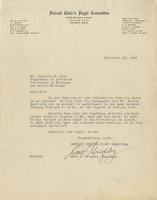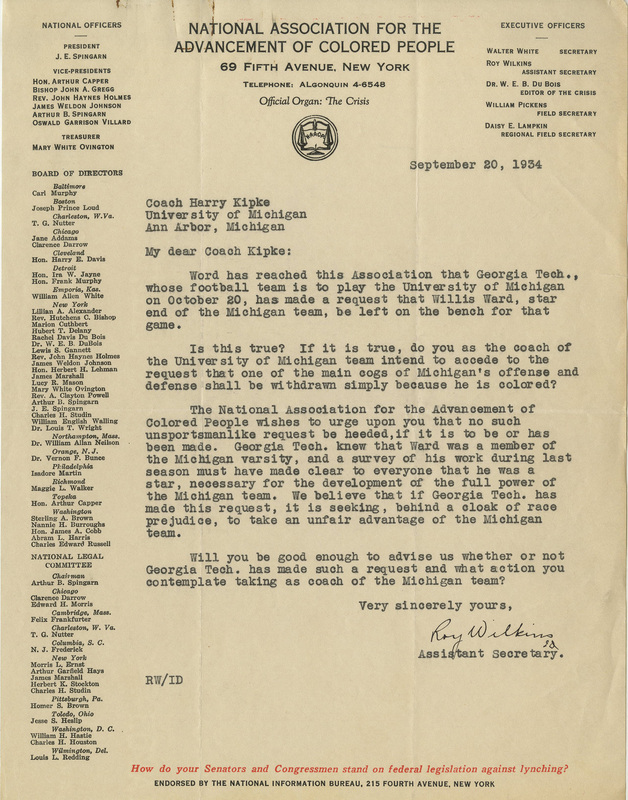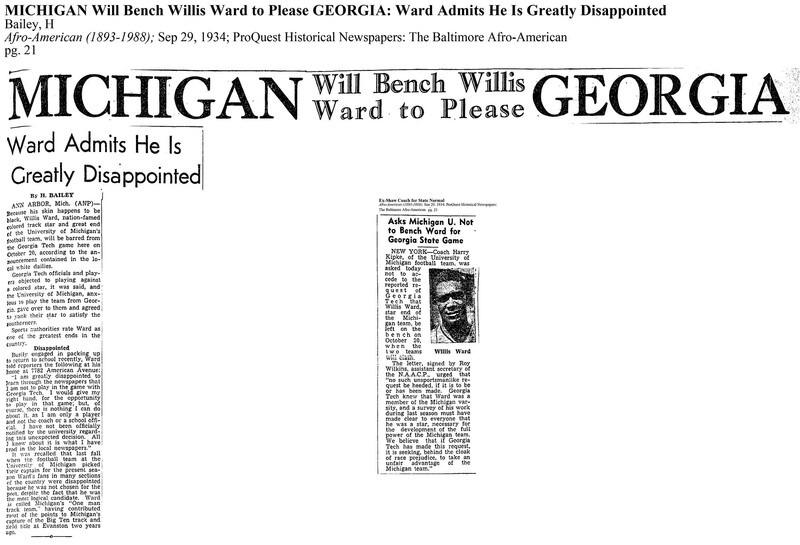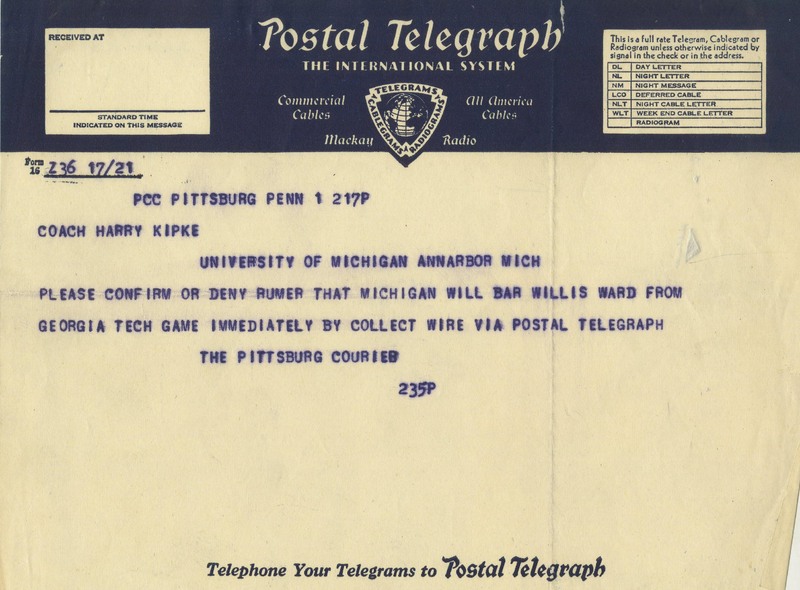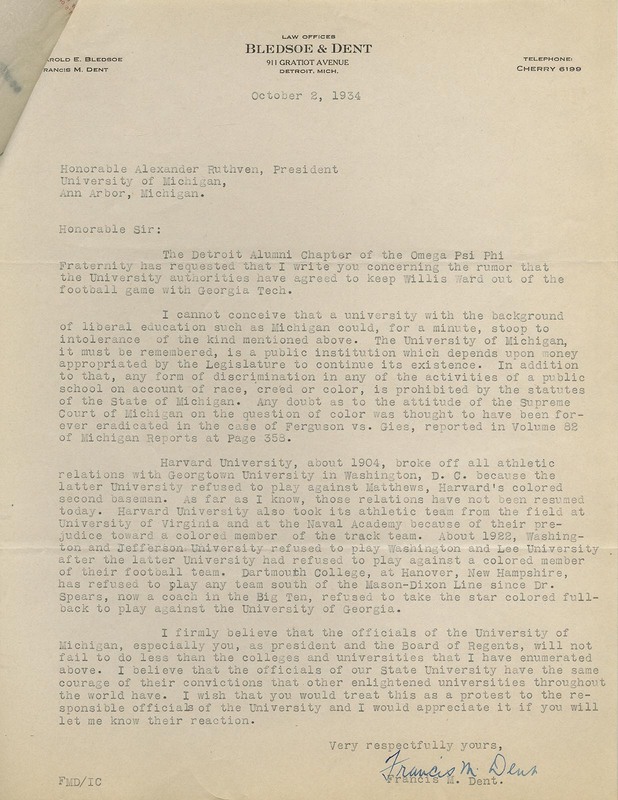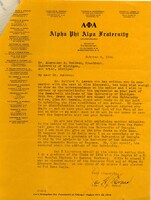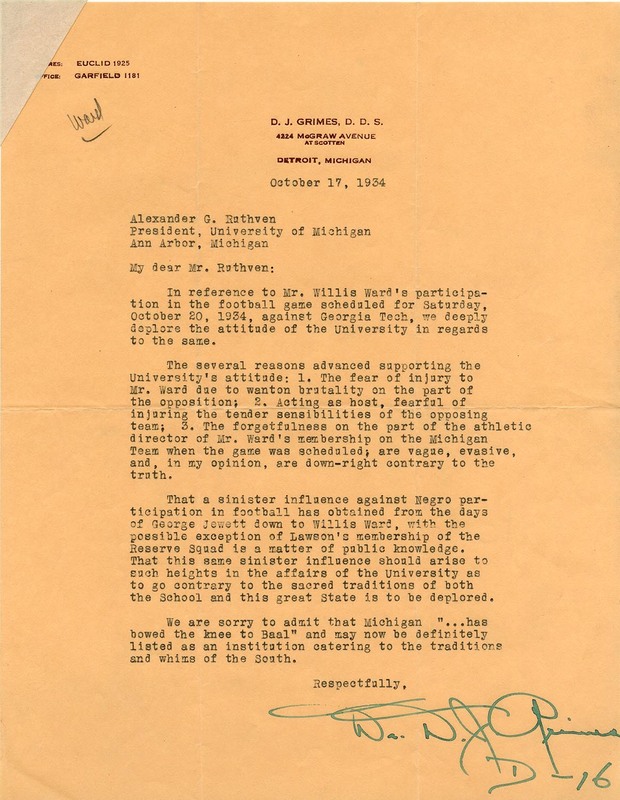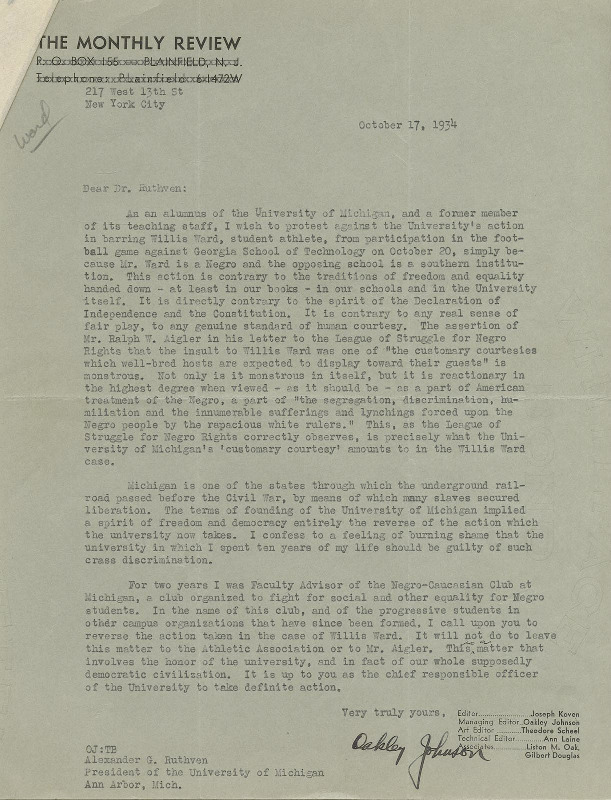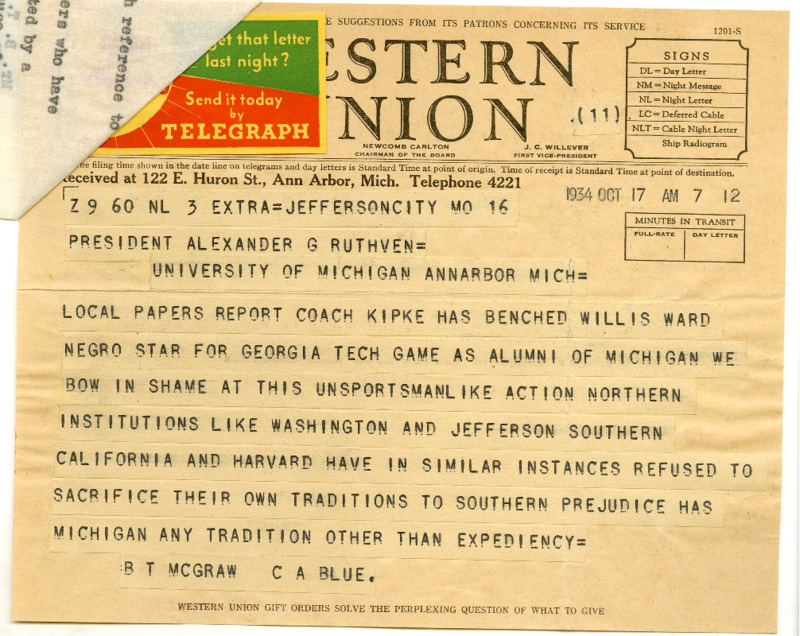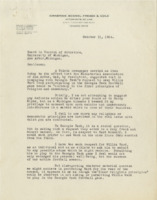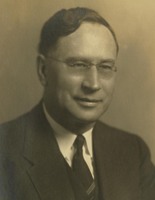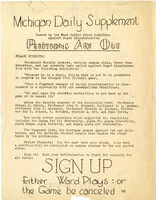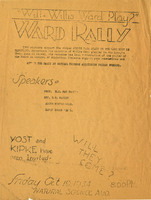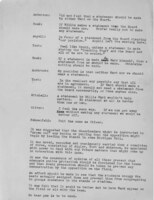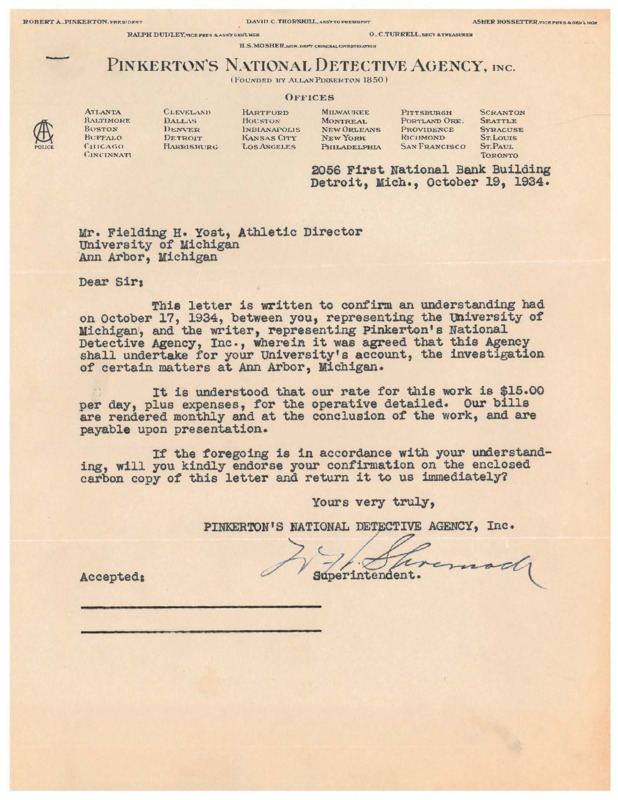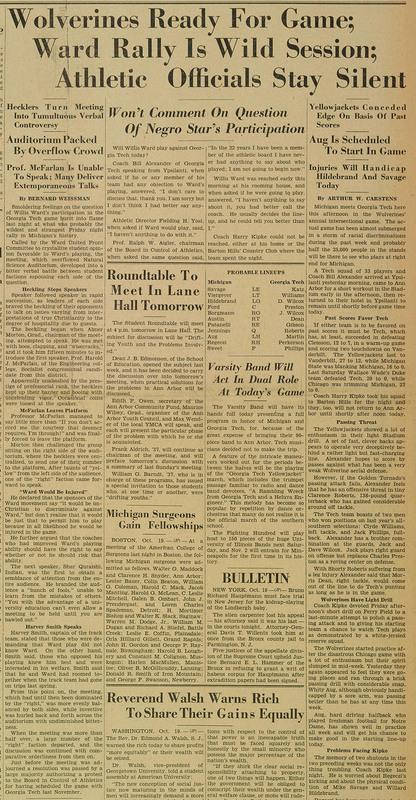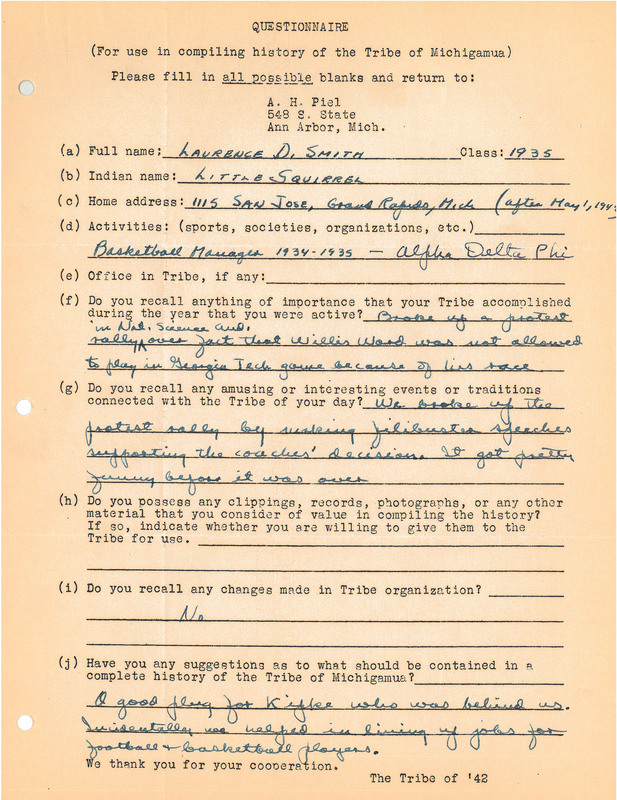Protest
Word of Ward’s Benching
By mid-September 1934, a few newspaper stories had appeared suggesting Ward would not be allowed to play against Georgia Tech. On September 20, Snow F. Grigsby, chairman of the Detroit Civic Rights Committee, wrote Yost: “Have you rendered such a decision, or is this newspaper agitation?”
Kipke received a letter of the same date from Roy Wilkins, national secretary of the NAACP, saying “word had reached the association” that Georgia Tech had requested Ward be left on the bench for the October 20 game “simply because he is colored.” Wilkins asked, “Will you please advise us whether or not Georgia Tech made such a request, and what action you contemplate taking?” When he did not receive a reply, Wilkins wrote a more strongly worded request, demanding that Ward be allowed to play. His letter was released to the Associated Negro Press and became the basis for articles in Black newspapers across the nation.
Alumni and Community Protests
African American alumni registered protests. D.J. Grime (D.D.S., 1916) deplored “the attitude of the University” in handling the Georgia Tech game, and noted that it was a matter of public knowledge “that a sinister influence against Negro participation in football has obtained from the days of George Jewett down to Willis Ward.” Michigan, he said, “had bowed the knee to Baal” and must now be listed as “an institution catering to the traditions and whims of the South.”
Joseph B. Evans (LSA 1912, Phi Beta Kappa), writing as the national secretary of Alpha Phi Alpha, sarcastically suggested Michigan’s two bad losses to Michigan State and Chicago could signify “the visitation of Providence on the wicked,” or at least that Kipke could not afford to give up the service of his best player. Evans predicted that the benching of Ward would lead to “a distinct shattering of team morale,” and that some of Ward’s teammates “will find it difficult to condone an affront to their fellow players.”
White alumni protested as well. Detroit attorney William Friedman (LL.B., 1901), writing on behalf of “himself and many other University of Michigan alumni,” stated that the treatment of Ward “has aroused more resentment at our University among its alumni as well as the laity” than anything since his graduation.
New York University’s 1934 football team sent a letter in support of Ward. In its own Jim Crow incident, NYU football had capitulated to the University of Georgia in 1929.
The Ann Arbor Ministerial Association passed a resolution asserting that holding Ward out of the game “would be contrary to the finer principles of both religion and democracy.”
However, not all alumni were critical of Ward’s benching. After reading a newspaper article about the Ministerial Association's protest, Toledo, Ohio, attorney Charles J. Cole (LL.B., 1926) offered his support for whatever action the Board in Control or Kipke might take. He did not see “where any religious or democratic principles are involved in the real issues with which you are confronted,” and condemned the protesters for the “asinine and unnecessary interference in a matter which is none of their business.” He would “rather see Ward on the sidelines than carried from the field.”
An anonymous post-game letter from a Detroit alumnus asked Yost if he or Kipke would welcome “colored people” as neighbors. “The answer being obvious,” the writer questioned why ten white men should be forced to play on a football team “alongside a descendant of Ham regardless of what his ability may be.”
Law professor Ralph Aigler, who was also Michigan's faculty representative to the Big Ten Conference and the most influential member of the Board in Control, was tasked with responding to the protests that had been addressed to Yost, Kipke, and University President Alexander Ruthven. Beyond his "Michigan forgot about Ward" explanation, Aigler cited what had become standard rationalizations for acquiescing to Jim Crow demands: It was the host's obligation to honor the visitor's customs; participation in intercollegiate athletics was a privilege, and the coach was the sole person to determine the lineup; a player should be held out for his own protection.
In 1929, NYU's justification was nearly identical.
Campus Support for Ward
On-campus support for Ward was initially organized by the National Student League, a small, leftist organization made up mostly of students from the East Coast, many of them Jewish. A coalition of other left-leaning student groups soon joined the League in forming the Ward United Front Committee Against Negro Discrimnation, under the banner “Ward Must Play.”
Flyers asking “Will Willis Ward Play?” and demanding “Either Ward Plays Or The Game Must Be Cancelled” blanketed campus. A Michigan Daily supplement announced a petition drive and listed ten faculty members who had signed; ultimately, up to 1,500 students and faculty reportedly signed the petition. The Daily was filled with articles and letters to the editor for ten days before the game. Most letters supported Ward, but there is some question as to the extent and depth of the student body’s commitment to the cause.
On campus, the Ward United Front Committee planned a mass meeting to be held in the Natural Science Building the night before the game. Yost and Kipke were invited to speak; neither accepted. Members of the Committee, several faculty members, and defenders of the Athletic Department's position were scheduled to speak.
The rally was barely underway when hecklers, led by members of Michigamua, disrupted the proceedings. The Michigan Daily headlined its story “Ward Rally is Wild Session.” Undoubtedly, the Michigamua men had at least the implicit support of Yost, Kipke, or both. Kipke was a member of the 1924 “tribe,” and Yost was an honorary member. One member later listed disrupting the Ward rally as his most memorable activity on campus and commented that Kipke “was behind us.”
For several days rumors had circulated about a planned demonstration involving up to 200 students who would silently take the field during the game. Yost hired the Pinkerton Detective Agency to investigate the leaders of the Ward Committee and uncover any plans for a protest. Two agents spent a day on campus, providing Yost with a list of the ringleaders that included the head of the National Student League—described as “decidedly Jewish”—and a group of students “who are foreigners, some orientals, [who have] radical and socialist ideas.” They concluded there were no substantive plans for a demonstration.
The October 19 Michigan Daily reported that the previous night, Willis Ward had made a “declaration of gratitude” to the students, faculty members, and organizations that had aided the campaign for his participation in the Georgia Tech game. It is the only record of Ward making a public comment in the immediate run-up to the game.
A few days before the game, a subgroup of the Board in Control that included Yost, some faculty members, and the two student members met to discuss how the Board should respond to any statement by Ward and potential protest in the stadium. The consensus was that no statement should be made. Among the game-day suggestions was that Ward not appear on the field or sit with the team, that the cheerleaders be instructed to "drown out" any booing or yelling by Ward supporters, and that there should be adequate police protection to prevent any demonstrations, but that no tear gas was to be used. A subcommittee of Yost, Aigler, and engineering professor Henry Anderson was empowered to deal with any future issues. No record of this meeting appears in the Board's official minutes.
On the eve of the game, the Athletic Department had still not made an official statement that Ward would not play.
Sources: Board in Control of Intercollegiate Athletics records, Bentley Historical Library; Ralph Aigler Papers, Bentley Historical Library; The Michigan Daily, ProQuest Historical Newspapers; Michigamua records, John Richard Behee, "Fielding Yost's Legacy to the University of Michigan" [dissertation], 1971; John Richard Behee, Hail to the Victors! Black Athletes at the University of Michigan, 1973; Tyran Kai Steward, "In the Shadow of Jim Crow: The Benching and Betrayal of Willis Ward" [dissertation], 2013.

